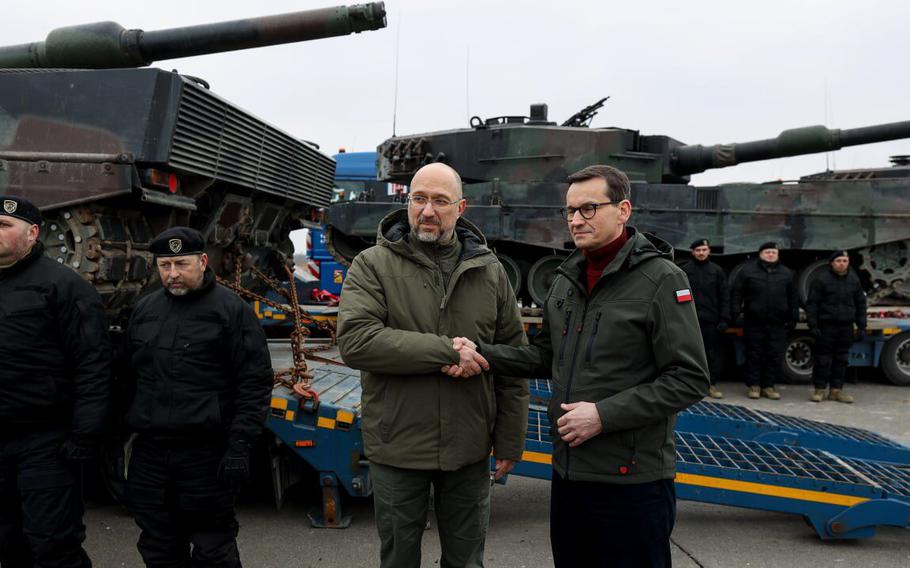
Polish Prime Minister Mateusz Morawiecki greets Ukrainian Prime Minister Denys Shmyhal during the delivery of the first Polish Leopard 2A4 main battle tank to Ukraine in February. Poland said this week that it will no longer supply its weapons to Ukraine. (Government of Ukraine)
Poland will no longer supply weapons to Ukraine, saying that it needs to focus more on arming itself against potential Russian aggression.
Prime Minister Mateusz Morawiecki said Wednesday on Polish television that the decision coincided with a diplomatic dispute between Warsaw and Kyiv over grain imports.
“We are no longer transferring weapons to Ukraine because we are now arming Poland with more modern weapons,” Morawiecki said.
Poland’s decision to halt weapon shipments does not appear to affect the country’s role as the primary distribution network for getting U.S. and other allied weaponry into Ukraine.
Since Russia’s February 2022 invasion of Ukraine, the U.S. has moved scores of troops into southeastern Poland to facilitate the flow of arms into the war-torn country.
But the decision, if it holds, would be a dramatic turn of events, considering that Poland has been a primary weapons supplier to Ukraine and one of its staunchest advocates in NATO.
The grain dispute highlights the economic strain Russia’s war on Ukraine is having on neighboring states and raises concerns about the durability of military support for Kyiv.
It stems from the closure of Black Sea grain shipment corridors because of threats from Russia. That has forced Ukraine to send exports over land, which in turn has flooded Europe with excess grain.
The surplus has angered farmers in Poland, where the ruling Law and Justice Party government is up for reelection next month. The party’s base is strong in rural areas.
“Ukrainian authorities do not understand the degree to which Poland’s farming industry has been destabilized. We are protecting Polish farmers,” Morawiecki told Polsat News television.
In the U.S., the Ukraine war also is a political hot-button issue, with Republican front-runner Donald Trump and some other candidates indicating that they would scale back or even end support for Kyiv if elected.
Earlier this month, Ukrainian President Volodymyr Zelenskyy said Russia is hoping the next U.S. president will turn against his country.
The Russians “are counting on the American elections very much,” Zelenskyy said at a security conference in Ukraine.
Despite the diplomatic turmoil between Warsaw and Kyiv, allies this week restated that they are committed to Ukraine for the long haul.
On Tuesday, Defense Secretary Lloyd Austin told world military leaders during a meeting at Ramstein Air Base that partners supporting Ukraine must “continue to dig deep” to arm the country.
“(Russian President Vladimir) Putin is betting he can bide his time and wait it out,” Austin told representatives of about 50 countries at the 15th meeting of the Ukraine Defense Contact Group. “He is wrong.”